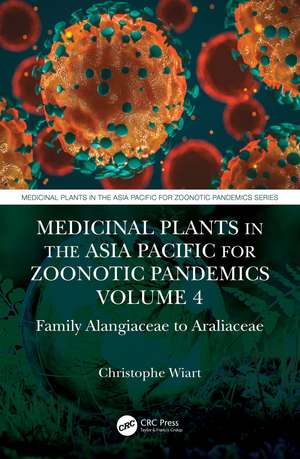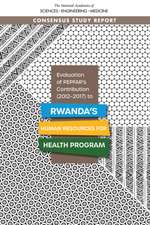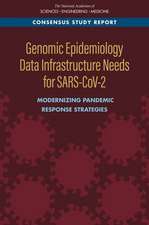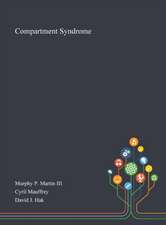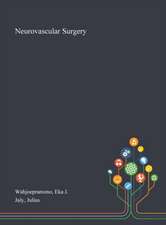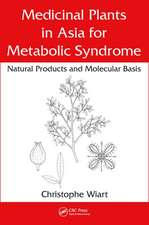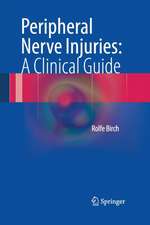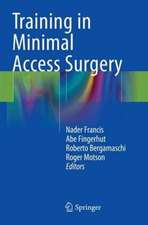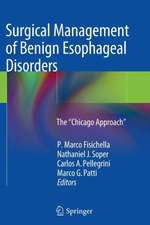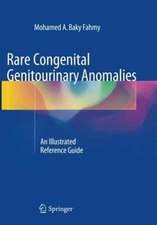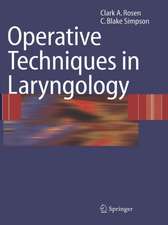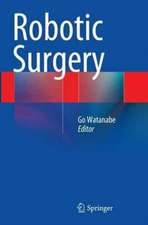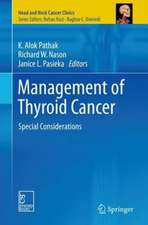Medicinal Plants in the Asia Pacific for Zoonotic Pandemics, Volume 4: Family Alangiaceae to Araliaceae: Medicinal Plants in the Asia Pacific for Zoonotic Pandemics
Autor Christophe Wiarten Limba Engleză Paperback – 12 mai 2022
This fourth volume in the Medicinal Plants in the Asia Pacific for Zoonotic Pandemics series provides an unprecedented, comprehensive overview of the pharmacological activity of more than 100 medicinal plants used for the treatment of microbial infections in Asia and the Pacific. The text discusses the actions of such plants against viruses and bacteria representing a threat of epidemic and pandemic diseases, including COVID-19, with an emphasis on the molecular basis and cellular pathways. Scientific names, botanical classifications and descriptions, medicinal uses, and chemical constituents are presented, along with chemical structures and a vast selection of bibliographical references.
FEATURES
- Introduces the molecular mechanism of natural products from medicinal plants in Asia on bacteria and viruses
- Includes phylogenetic presentations of a selection of medicinal plants and a chemotaxonomical rationale of antiviral and antibacterial actions
- Discusses the chemical structure–activity relationship, pharmacokinetics, and bioavailability of antimicrobial principles
"This book will be an important resource for scientists, as well as people passionate about helping to save these critical resources. Perhaps a new drug lead will be identified from at least one of these plants."
—From the Foreword by Dr. Mark S. Butler, MSBChem Consulting, Brisbane, Australia
| Toate formatele și edițiile | Preț | Express |
|---|---|---|
| Paperback (1) | 729.20 lei 43-57 zile | |
| CRC Press – 12 mai 2022 | 729.20 lei 43-57 zile | |
| Hardback (1) | 1926.00 lei 43-57 zile | |
| CRC Press – 12 mai 2022 | 1926.00 lei 43-57 zile |
Preț: 729.20 lei
Preț vechi: 801.32 lei
-9% Nou
Puncte Express: 1094
Preț estimativ în valută:
139.55€ • 144.81$ • 116.64£
139.55€ • 144.81$ • 116.64£
Carte tipărită la comandă
Livrare economică 17-31 martie
Preluare comenzi: 021 569.72.76
Specificații
ISBN-13: 9781032010342
ISBN-10: 1032010347
Pagini: 274
Ilustrații: 42 Halftones, black and white; 42 Illustrations, black and white
Dimensiuni: 178 x 254 x 25 mm
Greutate: 0.45 kg
Ediția:1
Editura: CRC Press
Colecția CRC Press
Seria Medicinal Plants in the Asia Pacific for Zoonotic Pandemics
ISBN-10: 1032010347
Pagini: 274
Ilustrații: 42 Halftones, black and white; 42 Illustrations, black and white
Dimensiuni: 178 x 254 x 25 mm
Greutate: 0.45 kg
Ediția:1
Editura: CRC Press
Colecția CRC Press
Seria Medicinal Plants in the Asia Pacific for Zoonotic Pandemics
Public țintă
Academic, Postgraduate, Professional, Professional Practice & Development, and Undergraduate AdvancedNotă biografică
Christophe Wiart is a French scientist. His fields of expertise are Asian ethnopharmacology, chemotaxonomy and ethnobotany. He has collected, identified and classified several hundred species of medicinal plants from India, Southeast Asia and China.Ethnopharmacology of medicinal plants in Asia Pacific; bioprospection, collection and identification of medicinal botanical samples and phytochemical and pharmacological study for the identification of lead compounds as novel antibacterial, anticancer, and antioxidant principles from rare plants from the rainforest of Southeast Asia.Dr. Christophe Wiart appeared on HBO's Vice (TV Series) in season 3, episode 6 (episode 28 of the series), titled "The Post-Antibiotic World & Indonesia's Palm Bomb." This episode aired on April 17, 2015. It highlighted the need to find new treatments for infections that were previously treatable with antibiotics, but are now resistant to multiple drugs. "The last hope for the human race’s survival, I believe, is in the rainforests of tropical Asia", said ethnopharmacologist Dr. Christophe Wiart. "The pharmaceutical wealth of this land is immense".
Cuprins
9. Medicinal Plants in Asia-Pacific for Microbial Infections: The Clade Asterids 10. Medicinal Plants in Asia-Pacific for Microbial Infections: The Clade Lamiids 11. Medicinal Plants in Asia-Pacific for Microbial Infections: The Clade Campanulids
Descriere
Viruses and plagues have constantly threatened the survival of humanity since the evolution of modern man. Medical advances thanks to the application of remedial plants have helped to fight back against some of the most nefarious bacterial and viral infections, giving humanity a fighting chance.
